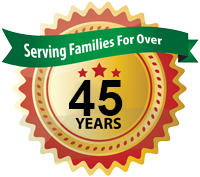Types of Home Care
About Home Health Care

An estimated 44.4 million Americans and Families, (21% of the adult population), are providing unpaid care to someone age 18 or older. These caregivers represent approximately 22.9 million households (21% of all those in the United States.).
Now more than ever, there is a greater need for a Paid Home Care Assistant to care for them since because many times the family caregiver also has a paid job and responsibilities, there’s children at home, or other commitments. Increasing the dependency on additional help with bathing, dressing, managing the transfers during the day, personal care demands or assisting with routine household chores.
Sometimes a decrease in independence is simply due to advancing years and the changes in dexterity, vision, hearing and cognitive function that often accompany the aging process.
Changes in independence may also be due to an acute event, such as an accident or stroke or may be the result of a chronic disease. The continued desire for family and friends to remain at home, or “age in place,” has created one of the fastest growing segments of the health care industry, in which we spend $50 billion dollars annually. As with any growing industry, a vast array of service providers emerge. Caregivers can be hired through an agency or independently and the many choices available can often be confusing and frustrating. Included here is information on home care agency options that can help to make the process more manageable.
Things You Need to Know To Determine your needs
Assessing Your Home Care Needs
First, determine the patient or family members care requirements.
- Will there be a need for hands-on care such as bathing, dressing and toileting?
- Are there cognitive issues that will require a different type of care?
- Will the care consist of household assistance and meal preparation?
- Will care be a combination of both personal and household assistance?
- Are there financial restrictions that will affect how or where care is received?
- Is the individual willing to receive help?
- Is home modification needed?
- Would home modification make the environment safe and accessible?
Determine the amount of time and the number of days that the caregiver will actually be needed in the home and write this information down so that you have it when calling an agency.
Help With Assessments
You may be able to make this assessment on your own, or you may need some outside assistance. If you require help from an outside source, you may call our office at any time for help. We can connect you to those who can perform assessments or direct you to those who can.
You may want us to refer you to a Care Manager who is certified in Geriatric care and they can assist you with a wide range of caregiving needs.
A geriatric care manager is a professional who specializes in assisting older people and their families making their long-term care arrangements. They have training in gerontology, social work, nursing or counseling. They can do in-home assessments, develop care plans and monitor services. They can also help families to confer and agree on the older person’s needs and how they can be met.
Sometimes an individual’s ability to remain in their own home, which helps them preserve self-sufficiency and dignity, may be achieved with services that are basic but an overall assessment and honesty of the care will make a big difference to the older adult patient.
THE TYPES OF CARE
Custodial Care or Supportive Care
- Usually provided by paraprofessionals— home health aides, home care aides and nursing assistants who provide hands-on care to people in their home, nursing homes or assisted living facilities.
- Includes assistance with bathing, dressing and mobility.
- Can consist of companionship, transportation, light housekeeping, laundry or similar tasks.
- Is not deemed “medically necessary.”
- Is not covered by Medicare or most private health insurance.
Skilled Care
- Typically provided to individuals who are recovering from an acute illness or event.
- Deemed to be medically necessary and given under the direction of a physician.
- Usually provided by health care professionals such as nurses, therapists or specially trained home health aides, sometimes called certified nursing assistants, who work under the direction of a physician and/or registered nurses.
- May also include social workers, some laboratory services, podiatry and medical services and equipment.
Most often skilled services are needed after a person has fallen and needs physical and occupational therapy, or experiences an acute event such as a stroke, or is discharged from a hospital after a short stay. Discharge planners and social workers assist in the coordination and arrangement of these services.
It is ALWAYS Patient Choice on what company you want to provide you with care.
No matter what is said, you have a choice to select any provider that is on your insurance plan.
Be certain to acquaint yourself early with your choices by calling your insurance company, social worker or discharge planner in the facility so that you can make sure services are arranged appropriately before going home.
NOTE: Medicare will only pay for skilled care in the home for a limited amount of time and only a few hours a week to treat an illness or injury providing:
- The care is furnished by a participating home health agency.
- The care needed includes intermittent skilled nursing or therapy.
- The patient is homebound and a physician authorizes the care plan



